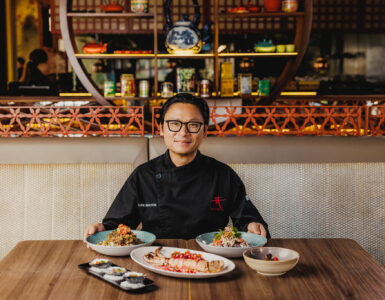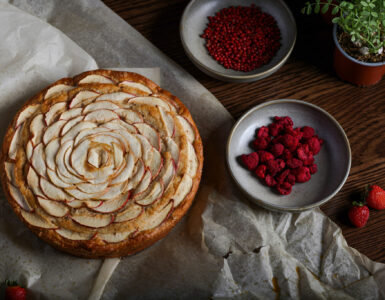From sustainable gift ideas to environmentally friendly feasts, The Star’s Amanda Visser shares her tips for a no-waste Christmas.
The season of excess is a time of fun, family, and well… excess. In Australia, we’re lucky enough to have had restrictions eased, which means that communal gatherings are back on the table. After the year that has been, we could all use a nourishing feast and a thoughtful present. However, there are plenty of ways to enjoy the seasonal festivities while looking out for the environment.
The Star Group Head of Sustainability, Amanda Visser, knows a thing or two about operating sustainably. Under her lead, The Star was recently recognised as a global industry leader in sustainability for the fifth year running, as ranked by the Dow Jones Sustainability Index.
The Star Group’s Beyond 2020: Sustainability Action Plan includes more than 70 initiatives aimed at reducing the environmental footprint of each property. Some of the everyday actions taken to this end include donating excess food to OzHarvest, conducting energy- and water-saving projects, recycling used soap with Soap Aid, donating old furniture and linens to charity, reducing single-used plastics, and composting. By 2030, The Star Group aims to achieve net-zero emissions.
But it’s not just large corporations that are able to make a difference to the health of the planet. Particularly at Christmastime, when day-old decorations are thrown out and piles of food get consumed by the trashcan, there are significant ways to reduce the amount of landfill generated without ruining the fun.
From DIY decorations to sustainably sourced feasts, here are some of Amanda’s best tips for hosting your most sustainable Christmas yet.

Christmas decorations
Amanda’s golden rule for sustainable Christmas decorations is quite simply: don’t waste. “If you think a gift or a decoration will be added to the landfill pile after the big day, I suggest not buying it,” she says. “And if you can make it yourself, even better! Your guests will appreciate homemade cards, wrapping paper, and table decorations. Try to buy only what you need.”
Fresh-cut flowers and plants make excellent table decorations and, if you are planning on putting up a Christmas tree, consider buying a real one and recycling it when it is no longer needed. If you are stringing your tree with fairy lights, buy LED lights, which generate much less electricity, and turn them off at night. These days it’s easy to find solar-powered Christmas lights for outdoor settings.
If you’re not feeling crafty enough for DIY decorations, consider buying handmade, recycled, upcycled or locally made decorations. This way, you can put money back into bushfire-affected communities, support skills and training, drive local industry, and support farmers and rural towns. A good resource for beautiful Australian Christmas decorations and gifts is Buy From The Bush.

Gift-giving
According to Amanda, Christmas gift-giving this year “is all about experiences and supporting the local community”.
“With such a tough year for our tourism, entertainment and accommodation industries, and with people so keen to get out and do more, this year is a great year to be buying food, wine, tickets and vouchers for your loved ones,” says Amanda.
“Choose experiences that are fun, memorable, create together, and that support local industry and employment – a voucher to your family’s favourite restaurant or a new one you haven’t tried, breakfast at the local café, tickets to the theatre or a show, an experience out on the water, or a hotel or spa package.
“Charity gifts are always a great way of ensuring every dollar goes where it is most needed. Find a charity that aligns with the person and gift them a donation. Try Oxfam Unwrapped, Australian Red Cross, Salvation Army, RSPCA, or Buy a Bale.”
If guests aren’t travelling too far to get home, another great sustainable gift idea is locally farmed produce, such as cheese sourced directly from farming communities or cherry boxes direct from the orchard. Try Farmhouse Direct, The Free Range Butcher, or other local companies that provide organic fruit and vegetable boxes and support local growers.
The Christmas feast
Sustainability has been a huge topic when it comes to food, particularly in relation to the meat, seafood and dairy industries, which are responsible for huge amounts of environmental damage. When it comes to creating a sustainable Christmas menu, the best thing you can do is include as many plant-based dishes as possible.
These days, there are also plenty of ways to ensure the meat and seafood you are buying is sustainable – even if you are purchasing it from one of the major supermarket chains. Make sure to opt for free-range eggs and meat, and look for sow stall free pork products.
When purchasing seafood, look for the Marine Stewardship Council (MSC) blue tick, which certifies that the species is sustainably farmed or caught. Most fishmongers, delicatessens, and even our largest supermarket chains stock MSC-certified seafood. More information on sustainable seafood choices can be found on the MSC website.
“If you are hosting, ask your guests to bring containers with them and send them home with leftovers,” suggests Amanda. “To help avoid waste, you can save dishes for the next day. I always turn the fruit platter into smoothies and make vegetable patties on Boxing Day from leftover roast potatoes. You can make stews and casseroles out of your roasts, add lemon juice to your salads to keep for the next day, and freeze your bread.”

10 Sustainable Christmas Tips
- Opt for a real Christmas tree and recycle it afterwards
- Buy 100 per cent recycled Christmas cards and wrapping
- Recycle all cans, bottles, and wrappers in your council recycling bin (Note: foil is recyclable!)
- Bag soft plastics and take them to a local supermarket drop-off box
- Include plenty of plant-based dishes on the menu
- Buy LED or solar-powered Christmas lights
- Compost leftovers to avoid food waste going into landfill
- Avoid single-use plastics in decorations, table settings, presents, etc.
- Cut bows and strings from presents to avoid birds getting caught up in landfill
- Order ahead from farmers’ markets or local growers if you can














